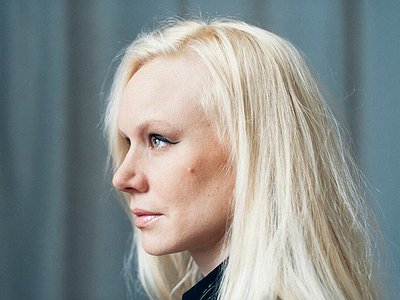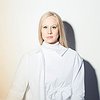Part 2
Could you take us through a day in your life, from a possible morning routine through to your work? Do you have a fixed schedule? How do music and other aspects of your life feed back into each other - do you separate them or instead try to make them blend seamlessly?
My days, weeks and months are really different all the time. It’s challenging because I’m constantly trying to plan more days with fixed schedules but also because my work has a tendency to be without boundaries, and at times exhausting.
If I were “only” making music and playing concerts it would be easier to divide my time between those areas. But as I’m also managing booking, administration, and my record label - everything together makes quite a workload.
I have been experimenting with how to plan days, sometimes first half of my day can be administrative with the other half for playing, rehearsing or making music. But for some musical or creative parts of my work I really need to clear days, weeks or even a month for just writing and playing. Creativity needs much more space than the other work I do.
Could you describe your creative process on the basis of a piece or album that's particularly dear to you, please? Where did the ideas come from, how were they transformed in your mind, what did you start with and how do you refine these beginnings into the finished work of art?
I have composed music to a poem by Charles Baudelaire which is a part of my new album ‘Go Dig My Grave’. I haven’t really read that much from his ‘Flowers of Evil’ before I got the new English translation by Anthony Mortimer. It’s so inspiring to experience a connection with something someone else has written, and I wanted to sing that poem ‘Invitation to the Voyage’. I got to enter the creative state of mind by sitting at the piano with the poem. It’s hard to describe exactly where the ideas come from, they just came… and it became that song. I like the words a lot and look forward to spend more time with these poems.
There are many descriptions of the ideal state of mind for being creative. What is it like for you? What supports this ideal state of mind and what are distractions? Are there strategies to enter into this state more easily?
I need space for my creative work. I can get inspired or collect ideas on a general basis, but to be able to work it out, I need time and a place with the instruments and gear needed for the work set-up. Everyday life, social media, emailing, production and communication with a lot of different people, concerns about how to pay my bills are distractions for the creative state of mind. I need to be alone and content with my solitude. I have learned more over the years about what I specifically need to be creative but one thing is sure, while I can make an ideal situation, I can’t force the creativity.
How is playing live and writing music in the studio connected? What do you achieve and draw from each experience personally? How do you see the relationship between improvisation and composition in this regard?
I like to envision something from the writing process when I play my songs live, that can be abstract like a feeling or a mood or more concrete like the room I was in when I made the song. It’s important to me to try and keep some of the original idea of the song when it’s transferred to the live setting. But it’s also natural for the music to move on and I have had good experiences with taking the music into various settings. It’s interesting to see how different musicians and instruments etc. can affect the live version or further development of the music. It feels important to leave room for improvisation in both settings, in the composition and in playing live.
How do you see the relationship between the 'sound' aspects of music and the 'composition' aspects? How do you work with sound and timbre to meet certain production ideas and in which way can certain sounds already take on compositional qualities?
Sound is a big part of my compositional work; the sound of my voice or words, the sound of the instruments I am using to compose. It can definitely affect what I make and how a piece turns out. I spend a lot of time thinking about how to record and produce, or how to play things live to meet the original idea of the sound of my music. Sometimes I try to keep close to the way the music was made, and sometimes I would like to put the music in new surroundings.
Our sense of hearing shares intriguing connections to other senses. From your experience, what are some of the most inspiring overlaps between different senses - and what do they tell us about the way our senses work? What happens to sound at its outermost borders?
Sounds and music can make me see or feel things I didn’t know existed, I think that is pretty wonderful.
Art can be a purpose in its own right, but it can also directly feed back into everyday life, take on a social and political role and lead to more engagement. Can you describe your approach to art and being an artist?
Art should naturally engage, that can be locally in a human being or in a wider aspect. Art is the stories about us, the humanity, how we feel or think about living, art is democracy, and to be heard and seen even though we are different.
It is remarkable, in a way, that we have arrived in the 21st century with the basic concept of music still intact. Do you have a vision of music, an idea of what music could be beyond its current form?
Music is such a powerful force and makes connections in our minds and between human beings in ways nothing else does the exact same way. That quality will always exist somehow, even if the society now and in the future, may try to reduce its importance through connecting music to for example branding or capitalistic commercial values.






